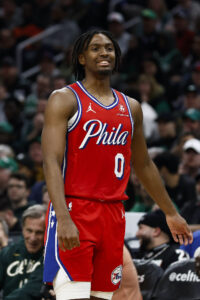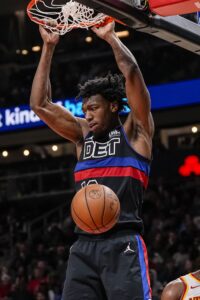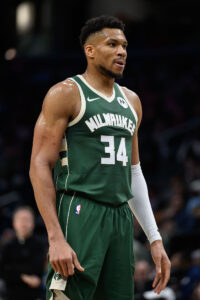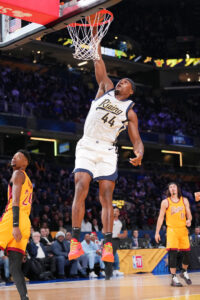As we outlined in a glossary entry earlier today, the value of a qualifying offer for a player eligible for restricted free agency can increase or decrease depending on whether or not he meets the “starter criteria.”
A player who is eligible for restricted free agency is considered to have met the starter criteria if he plays at least 2,000 minutes or starts 41 games in the season before he reaches free agency — or if he averages either of those marks in the two seasons prior to his restricted free agency.
In many cases, the difference in the qualifying offer amounts is negligible. For instance, since the Sixers will almost certainly sign Tyrese Maxey to a long-term, maximum-salary contract this summer, it doesn’t really matter that he has bumped the value of his qualifying offer a little by meeting the starter criteria.
But in other cases, the adjusted qualifying offer amount could have a real impact on how a player’s free agency plays out by making his team more or less likely to actually issue the QO — and by making the player more or less likely to accept it.
Here are the players whose projected qualifying offers will change as a result of the starter criteria this season:
Players drafted between Nos. 10 and 30 who met the starter criteria:
 Bey, Maxey, and Quickley would have had qualifying offers worth $6,498,258, $6,259,588, and $6,128,004, respectively, if they had fallen short of the starter criteria. Instead, their QOs will each be worth $8,486,620.
Bey, Maxey, and Quickley would have had qualifying offers worth $6,498,258, $6,259,588, and $6,128,004, respectively, if they had fallen short of the starter criteria. Instead, their QOs will each be worth $8,486,620.
As noted above, the QO change won’t have any effect on Maxey’s free agency. It’s unlikely to affect Quickley either, since the Raptors will be looking to sign him to a multiyear deal. But it could make a difference for Bey, who tore his ACL last month to bring an up-and-down season to an early end.
A healthy Bey would probably be a safe bet to to get his qualifying offer despite a disappointing season, but ACL recoveries are lengthy processes. If Bey isn’t going to play much – or at all – next season, will the Hawks want to risk him accepting a one-year qualifying offer worth $8.5MM that would set him up to become an unrestricted free agent in 2025?
That QO decision will likely depend on whether or not the Hawks envision Bey as part of their long-term future and whether they expect to reach a multiyear agreement with him.
Second-round picks or undrafted free agents who met the starter criteria:
An experienced veteran who will turn 29 later this year, Fontecchio spent the first part of his career playing in Europe and has just two years of NBA experience, so he’ll be a restricted free agent this summer. His qualifying offer got bumped from $3,806,090 to $5,216,324 when he met the starter criteria.
Fontecchio has been a bright spot in Detroit, averaging 15.4 points per game with a .426 3PT% in 16 games as a Piston. Based on those numbers – and his solid first-half play in Utah – the Italian wing is probably in line for a salary exceeding $5.2MM, which means the QO bump shouldn’t be a difference-maker.
Top-14 picks who won’t meet the starter criteria:
 As a former No. 2 overall pick, Wiseman would have been in line for a qualifying offer worth $15,815,870 if he had made at least 41 starts or played 2,000 minutes. Because he fell short, his actual QO will be worth less than half that ($7,744,600).
As a former No. 2 overall pick, Wiseman would have been in line for a qualifying offer worth $15,815,870 if he had made at least 41 starts or played 2,000 minutes. Because he fell short, his actual QO will be worth less than half that ($7,744,600).
Wiseman hasn’t shown a whole lot in Detroit, averaging just 6.9 points and 5.0 rebounds in 16.6 minutes per game this season across 59 appearances. But the Pistons will have a ton of cap room this offseason — maybe they’d be comfortable bringing back Wiseman for one more year and trying again to unlock his full potential if the price is just $7.7MM instead of $15.8MM. I’m still skeptical he’ll get that qualifying offer, but it’ll at least be a tougher decision now.
Toppin’s qualifying offer, meanwhile, will drop from $9,170,460 to $7,744,600, but I think the Pacers would have extended it either way. The former No. 8 overall pick has had his best season in 2023/24 as a reserve in Indiana, establishing new career highs in points per game (10.1), field goal percentage (57.2%), and three-point percentage (40.3%), among other categories.
The qualifying offer change for Lewis is marginal — his QO will dip by less than $200K from $7,913,687. He’s unlikely to receive it either way.
It’s worth noting that three other top-14 picks from the 2020 draft met the starter criteria this season. The qualifying offers for Bulls forward Patrick Williams and Cavaliers forward Isaac Okoro will remain at $12,973,527 and $11,828,974, respectively. Those aren’t cheap, but I’d still be a little surprised if either team decides to pass on the QO.
Former Pistons guard Killian Hayes also met the starter criteria, but was later waived, so he won’t get a qualifying offer this June. If he had remained under contract and was eligible to receive one, it would have been worth $9,942,114.
 Antetokounmpo missed the final three games of the regular season due to an injury that the Bucks diagnosed as a left soleus (calf) strain. Shams Charania of The Athletic reported on Monday that there was some “real doubt” about Giannis’ ability to return for Game 1 this weekend, so Wojnarowski’s update today doesn’t come as a major surprise.
Antetokounmpo missed the final three games of the regular season due to an injury that the Bucks diagnosed as a left soleus (calf) strain. Shams Charania of The Athletic reported on Monday that there was some “real doubt” about Giannis’ ability to return for Game 1 this weekend, so Wojnarowski’s update today doesn’t come as a major surprise. Bey, Maxey, and Quickley would have had qualifying offers worth $6,498,258, $6,259,588, and $6,128,004, respectively, if they had fallen short of the starter criteria. Instead, their QOs will each be worth $8,486,620.
Bey, Maxey, and Quickley would have had qualifying offers worth $6,498,258, $6,259,588, and $6,128,004, respectively, if they had fallen short of the starter criteria. Instead, their QOs will each be worth $8,486,620. As a former No. 2 overall pick, Wiseman would have been in line for a qualifying offer worth $15,815,870 if he had made at least 41 starts or played 2,000 minutes. Because he fell short, his actual QO will be worth less than half that ($7,744,600).
As a former No. 2 overall pick, Wiseman would have been in line for a qualifying offer worth $15,815,870 if he had made at least 41 starts or played 2,000 minutes. Because he fell short, his actual QO will be worth less than half that ($7,744,600). An undrafted free agent out of Kentucky, Tshiebwe has only appeared in eight NBA games as a rookie, but had a monster season for the Indiana Mad Ants in the G League, where he began the Showcase Cup in the fall by racking up 33 points and 22 rebounds in his first ever NBAGL outing.
An undrafted free agent out of Kentucky, Tshiebwe has only appeared in eight NBA games as a rookie, but had a monster season for the Indiana Mad Ants in the G League, where he began the Showcase Cup in the fall by racking up 33 points and 22 rebounds in his first ever NBAGL outing.